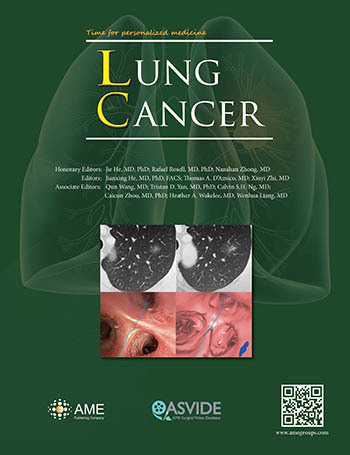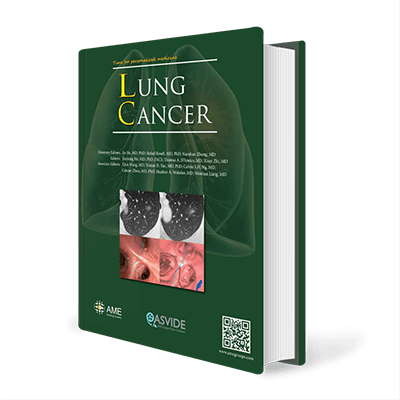
Lung Cancer
| Editors: | Jianxing He; Thomas A. D'Amico; Xiuyi Zhi |
Publisher: AME Publishing Company (2015)
ISBN-13: 978-9881402707
Hardcover: 667 pages
Language: English
Despite many years of dedicated effort, including basic, translational and clinical research, public education, and health care policy, lung cancer remains the number one cause of death by malignancy in the world, and it is responsible for as many deaths as colon, breast, pancreas and prostate cancers combined in the US. Thus, successful efforts to better understand and better treat lung cancer will have long lasting ramifications, for patient care specifically and for public health globally, as well. This volume, Lung Cancer, is just such an effort.
Honorary Editors
| Jie He | Department of Thoracic Surgical Oncology, Cancer Institute & Hospital, Chinese Academy of Medical Sciences and Peking Union Medical College; National Cancer Center, Beijing 100021, China. |
| Rafael Rosell | Breakthrough Cancer Research Unit, Pangaea Biotech, Dexeus University Institute, Catalan Institute of Oncology, Badalona, Spain |
| Nanshan Zhong | Academician, Chinese Academy of Engineering.The First Affiliated Hospital of Guangzhou Medical University; Guangzhou Institute of Respiratory Disease & China State Key Laboratory of Respiratory Disease; National clinical research center for respiratory Disease, Guangzhou 510120, China |
Editors
| Jianxing He | Department of Cardiothoracic Surgery, the First Affiliated Hospital of Guangzhou Medical University; Guangzhou Institute of Respiratory Disease & China State Key Laboratory of Respiratory Disease; National clinical research center for respiratory Disease, Guangzhou 510120, China |
| Thomas A. D’Amico | Department of Surgery, Duke University Medical Center, Durham, North Carolina, United States |
| Xiuyi Zhi | Department of Thoracic Surgery, Xuanwu Hospital; Beijing Lung Cancer Center, Capital Medical University, Beijing, China |
Associate Editors
| Qun Wang | Shanghai Zhongshan Hospital of Fudan University, Shanghai, China |
| Tristan D. Yan | Department of Cardiothoracic Surgery, Royal Prince Alfred Hospital, University of Sydney, Sydney, Australia; The Collaborative Research (CORE) Group, Macquarie University, Sydney, Australia |
| Calvin S.H. Ng | Department of Surgery, Prince of Wales Hospital, The Chinese University of Hong Kong, Hong Kong SAR, China |
| Caicun Zhou | Department of Oncology, Shanghai Pulmonary Hospital, Affiliated to Tongji University School of Medicine, Shanghai, China |
| Heather A. Wakelee | Division of Oncology, Department of Medicine, Stanford University School of Medicine, Stanford Cancer Institute, CA , USA |
| Wenhua Liang | Department of Thoracic Oncology, the First Affiliated Hospital of Guangzhou Medical University, Guangzhou, China |
Table of Contents
Preface
Pathology
1 Molecular biology of lung cancer
16 The pivotal role of pathology in the management of lung cancer
34 Towards optimal pathologic staging of resectable non-small cancer
42 Molecular determinants of lung cancer metastasis to the cent
53 Genetic susceptibility to lung cancer and co-morbidities
64 Non-neuronal cholinergic system in airways and lung cancer susceptibility
Diagnosis
75 Diagnostic bronchoscopy--current and future perspectives
90 Modern diagnostic and therapeutic interventional radiology in lung cancer
105 Screening for lung cancer with low-dose computed tomography: a review of current staus
125 Exhaled breath analysis for lung cancer
138 Interventional pulmonology approaches in the diagnosis and treatment of early stage non small cell lung cancer
154 Post-therapeutic positron emission tomography/computed tomography for early detection of non-small cell lung cancer recurrence
163 New TNM classifcation: achievements and hurdles
Treatment
172 A review of clinical practice guidelines for lung cancer
190 Customized chemotherapy in metastatic non-small cell lung cancer(NSCLC)
199 Management of elderly patients
207 Alternative to surgery in early stage NSCLC—interventional radiologic approaches
221 Supportive and palliative care for lung cancer patients
Surgery
227 Thoracoscopic sleeve resection—the better approach?
230 Surgery in 2013 and beyond
246 Management of ground-glass opacities: should all pulmonary lesions with ground-glass opacity be surgically resected?
256 Video-assisted thoracoscopic lobectomy—from an experimental therapy to the standard of care
258 Techniques of VATS lobectomy
263 Contraindications of video-assisted thoracoscopic surgical lobectomy and determinants of conversion to open
272 Current costs of video-assisted thoracic surgery (VATS) lobectomy
276 Indication for VATS sublobar resections in early lung cancer
283 Totally thoracoscopic pulmonary anatomic segmentectomies: technical considerations
291 Teaching video-assisted thoracic surgery (VATS) lobectomy
297 Right, middle, and lower bronchial sleeve lobectomy by videoassisted thoracic surgery
300 Non-intubated complete thoracoscopic bronchial sleeve resection for central lung cancer
304 Anesthesia with nontracheal intubation in thoracic surgery
310 Video-assisted thoracoscopic lobectomy for non-small cell lung cancer in patients with severe chronic obstructive pulmonary disease
318 Analysis of feasibility and safety of complete video-assisted thoracoscopic resection of anatomic pulmonary segments under non-intubated anesthesia
326 Comparative study of systematic thoracoscopic lymphadenectomy and conventional thoracotomy in resectable non-small cell lung cancer
Medical Oncology
333 Neoadjuvant chemotherapy in early-stage non-small cell lung cancer
338 Adjuvant chemotherapy of completely resected early stage nonsmall cell lung cancer (NSCLC)
346 VATS lobectomy facilitates the delivery of adjuvant docetaxel-carboplatin chemotherapy in patients with non-small cell lung cancer
353 Anti-tumor immune response in early stage non small cell lung cancer (NSCLC): implications for adjuvant therapy
361 Adjuvant molecularly targeted therapy—epidermal growth factor tyrosine kinase inhibition and beyond
365 The continuing role of chemotherapy for advanced non-small cell lung cancer in the targeted therapy era
375 Chemotherapy advances in small-cell lung cancer
391 Targeted therapy in lung cancer: IPASS and beyond, keeping abreast of the explosion of targeted therapies for lung cancer
408 Apoptotic agents
414 Adaptive resistance to targeted therapies in cancer
Radiotherapy
422 State of the art of radiotherapy
433 Recent advances in radiotherapy for thoracic tumours
439 Alternatives to surgery in early stage disease—stereotactic body radiotherapy
447 Post-operative radiation therapy
457 Proton radiotherapy in the treatment of lung cancer
Radiotherapy
464 Prognostic and predictive biomarkers in early stage non-small cell lung cancer: tumor based approaches including gene signatures
474 Prognostic and predictive biomarkers in early stage NSCLC: CTCs and serum/plasma markers
490 Copy number gains of FGFR1 and 3q chromosome in squamous cell carcinoma of the lung
501 Predictive models for customizing chemotherapy in advanced non-small cell lung cancer (NSCLC)
513 Are we ready to use biomarkers for staging, prognosis and treatment selection in early-stage non-smallcell lung cancer?
527 Tumor heterogeneity: evolution through space and time in EGFR mutant non small cell lung cancer patients
539 EGFR molecular testing in African-American non-small cell lung cancer patients - a review of discrepant data
544 International trial of adjuvant therapy in high risk stage I nonsquamous cell carcinoma identified by a 14-gene prognostic signature
548 Impact of EGFR mutation status on tumor response and progression free survival after first-line chemotherapy in patients with advanced non-small-cell lung cancer: a meta-analysis
Translational Medicine
560 FGFR1 amplifications in squamous cell carcinomas of the lung: diagnostic and therapeutic implications
569 ALK and ROS1 as a joint target for the treatment of lung cancer: a review
584 Activated RET and ROS: two new driver mutations in lung adenocarcinoma
594 HER2 driven non-small cell lung cancer (NSCLC): potential therapeutic approaches
600 Targeting EML4-ALK driven non-small cell lung cancer (NSCLC)
614 KRAS mutant NSCLC, a new opportunity for the synthetic lethality therapeutic approach
624 The role of SOX2 in small cell lung cancer, lung adenocarcinoma and squamous cell carcinoma of the lung
632 Inhibition of insulin-like growth factor receptor: end of a targeted therapy?
641 MET inhibition in lung cancer
658 Irreversible EGFR-TKIs: dreaming perfection
Other Editions

| 名誉主编: | 赫捷、Rafael Rosell、钟南山 |
| 主 编: | 何建行、支修益、Thomas A. D’Amico |
| 副 主 编: | 王群、Tristan D. Yan、Calvin S.H. Ng、周彩存、Heather A. Wakelee、梁文华 |



